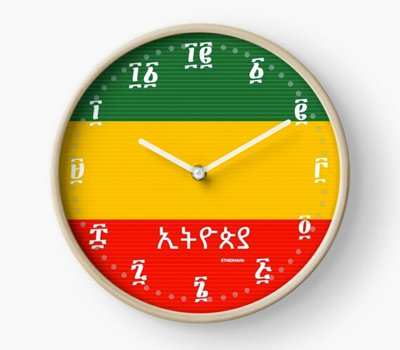Ethiopia Time and Date

Time in Ethiopia now
Ethiopian Time
The Ethiopian time is unique. Instead of the 24-hour clock used in most parts of the world, Ethiopians use a 12-hour clock that starts at sunrise (which is 1:00 on the clock) and ends at sunset (which is 12:00 on the clock). This means that the time of day is constantly changing throughout the year, with longer days in the summer and shorter days in the winter. Ethiopians also divide the day into two cycles of 12 hours each, with the first cycle starting at sunrise and the second cycle starting at sunset.
To interpret the Ethiopia time, it is essential to know that it reflects the importance of the sun in Ethiopian culture and religion. In Ethiopia, the sun is seen as a symbol of God’s presence, and the sunrise and sunset are important times for prayer and reflection in Ethiopia’s main religions. Therefore, the Ethiopian clock is not only a tool for measuring time but also a reminder of the importance of spirituality and connection to nature.
Ethiopia Time Zone
Ethiopia is on East Africa Time (EAT) which is UTC+03. It is common to use the 12-hour clock as the start of the day is dawn not midnight like most countries, therefore, 7AM is 1AM and 6PM is 12PM. If you are planning a trip to Ethiopia, it is essential to know the unique approach of time in Ethiopia. Understanding how Ethiopians measure and understand time will help you navigate the country more easily and appreciate its rich culture and traditions. As daylight in Ethiopia is consistent throughout the year, the country does not utilise daylight saving time.
Time in Ethiopia
When interacting with Ethiopians, it is essential to be aware of these different timekeeping systems and to show respect for the country’s traditions and customs. A common way of telling time in Ethiopia is by using events or activities that typically occur at specific times of the day. For example, if someone says “after lunch,” they mean around 2pm, which is when most Ethiopians take a midday break. If some one asks you what time in Ethiopia, remember to tell the time in AM/PM format.
Understanding time in Ethiopia goes beyond just knowing the different ways it is measured and experienced. Ethiopian time is intertwined with its culture, religion, and social norms, and being aware of these nuances can help you connect more deeply with the people and traditions of this beautiful country. By recognising the significance of the Ethiopian calendar and clock, and the various ways in which time is expressed, you can gain a greater appreciation and connection with Ethiopia’s rich culture and traditions the next time you are in Ethiopia.
